When in New Roman do as the New Romans do, I said to myself, and downloaded this biography while in Istanbul, which, when it was Constantinople called itself New Roman. (We were told the city never styled itself Constantinople, that being a nickname that stuck when Emperor Constantine ruled.) Atatürk (1881-1938) is the name that everyone associates with Turkey. Who was he? What did he do? Why did he do it? These are some of the questions that come to mind.
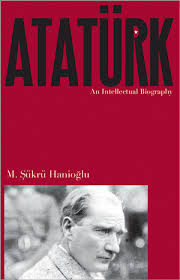
He was born in Salonica, and there is the first irony, Salonica today is Thessalonica, the second largest city of contemporary Greece. This fervent Turk and founder of Turkey and unremitting enemy of Greece was born there.
HIs parents were ethnic Turks. His father looked to the future and saw Europe while his mother looked to the past and saw Islam. She wanted the boy to go to a Mosque school where the curriculum was the Koran. The parental compromise was for young Mustafa to go the Mosque school for the first two years and then to a public school. That is the sum total of his exposure to Islam.
At fourteen, on his own initiative, he applied to and entered a military academy because he wanted to learn mathematics, science, engineering, and languages. These subjects were taught in the military academy and not in the impoverished normal schools. There began his military career on a foundation of Enlightenment science and rationality. He had an enormous intellectual appetite and became a lifelong autodidact, cobbling together ideas and facts from a range of discordant and sometimes unreliable sources.
He entered the army of the Ottoman Empire, a large, ramshackle assembly of peoples and places from Libya to Yemen to Saudi Arabia. It was polyglot and dilapidated. The Arab peoples far away from Istanbul were restive, but more pressing were Greece and Russia on the borders.
The young Mustafa saw combat in border wars with Greece and Bulgaria. He learned some lessons. Both the Greeks and Bulgars had national and ethnic unity. The Ottomans had the Sultan. Moreover, thanks the tacit support of Great Britain, the Greeks had modern weapons – rifles not sabres.
Then came the big one, the Great War. The Ottoman Empire blocked Russian access to the Mediterranean Sea and held vast territories that were oil rich. It was engaged in the Great War with the Russians to the North, and with the British in Mesopotamia, i.e., Iraq and Palestine, with the Greeks in the Balkans, with the Italians in Libya and Eritrea. The list goes on.
Mustafa commanded a garrison on the Dardanelles, frustrated that he could not get into the action, and then the war came to him with the Allied attack at Gallipoli.
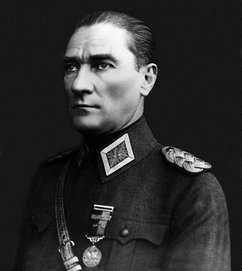
There followed eight months of near continuous battle with a combined force of British, French, Australians, and New Zealanders. Mustafa proved a master tactician, for though he had superior numbers his troops were not trained and were poorly armed and equipped. His used the terrain and local knowledge to anticipate the Allies manoeuvres, landings, and assaults. He resisted both the pressure of his German military advisor to withdraw to an area where he could use his larger army to crush the Allies, and the pressure from the Sultan to throw his men into suicide attacks to drive the infidels into the sea.
In January 1916 the Allies quit and Mustafa became the man of the hour. This was the only victory for the Ottomans and he was lionised, even as the Ottoman Empire disintegrated.
The Sultan became a figurehead for a cabal (which the author implies was responsible for the Armenian genocide) which sued for peace at any price, thereby alienating many natives. The Allies occupied Istanbul well into 1921 on the ground of controlling the Bosphorus and thereby sealing off the emergent Soviet Union from at the Mediterranean during the Civil War between the Reds and Whites. The Sultan was in effect a prisoner in a gilded cage.
The war hero Mustafa convened a Turkish Grand Assembly in the dusty town in the middle of Anatolia, at first to rally a force to push the Allies out and restore the Sultan to authority while defending the faith of Islam. While all this was going the Arab states hived off the Ottoman Empire, and left a more homogenous residue and freed Mustafa to purse an increasingly nationalist program.
There was another war with Greece, and once again Mustafa prevailed to hang on to Rumeli (the European rump of Turkey, the word is a corruption of Roman). His trials by fire made him legend, and he learned quickly how to exploit it.
He promoted the idea that Turks were the first people and that humanity spread from central Asia, and that these were Turks. In this account the ancient Greeks derived from Turks, as did everyone else. He promoted a racial identity as the key to nationalism, thereby excluding Jews, Kurds, Yazidis, Arabs, and others in the remnant of Turkey.
With top down social engineering he tried to make Turkey into a Western European country by creating a Turkish language and alphabet to replace the Persian-Arabic script, by starting free public education, by minimising Islam, and by much more. He made that dusty town in central Anatolia the capital and named it Ankara which today is a modern European-looking city. He banned the veil for women and promoted European dress for women as well as men. His efforts predated those of the Shah or Iran to do something similar in the 1960s and 1970s.
None of these efforts at the social engineering went smoothly. The language change was bungled and took years to resolve, with the result being a Roman alphabet with a thick undergrowth the accents that is not the simple, rational creation he wanted. Islam withstood his efforts even during his lifetime. He lost the battle of veil and had to relent.
But his changes did create an enduring social and political elite akin to those of Western Europe, especially in the big cities of Istanbul, Ankara, Izmir, and Bursa. This elite is larger and more varied than that terms includes in most other European countries, the author claims but does not explain. Some say today there are three Turkeys: Istanbul the city-state is one, the remainder of coastal Western Turkey is another, and Eastern Turkey the last.
His government was authoritarian though cloaked in the rhetoric of a republic, a free press, equality before the law, and parliamentarianism, but woe betide anyone who criticised Mustafa Kemal Atatürk who had a thin skin. Newspapers were closed, journalists arrested, and some unionist were murdered. Bad as all that was, compared to his contemporaries in Germany, Italy, and Spain it was mild.
Five percent of the members of his last parliament were women. Not much, right? Well it was more than any where in Europe at the time, and no later parliament in Turkey had as many women until 2010.
Though not invoked by the author, it is clear that Atatürk saw himself as a latter-day philosopher-king making a society anew from his brow. Of course, he would not footnote Plato, a hated Greek. He had a formidable brow along with blue eyes.
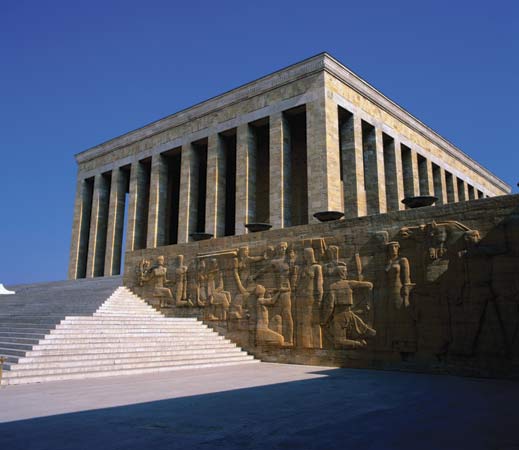 The Ataturk tomb in Ankara.
The Ataturk tomb in Ankara.
The book is true to its title. There is little of the man’s life beyond an outline, and nothing about his formative influences, private life, or inner personality. The bulk concerns his efforts to compound a pseudo-scientific Turkish identity. The author treats the subject with an even hand.
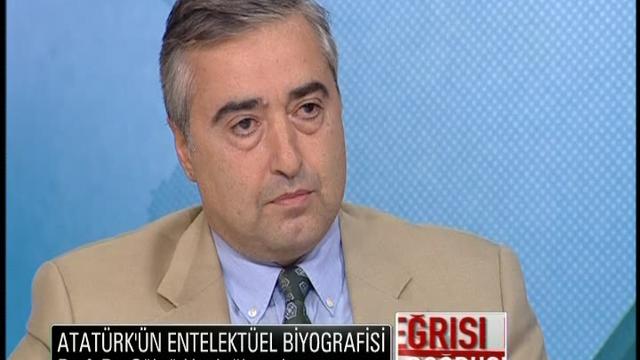 Şükrü Hanioğlu
Şükrü Hanioğlu
Appendix: The Gallipoli invasion, so maligned in Australian history, was the only strategic initiative of World War I. Its purpose was twofold, first to open the Mediterranean Sea to Russia to keep it in the war and second to force the Germans to weaken both the Western and Eastern fronts by diverting ever more men and materiel to the Middle East. In the course of planning and organising the invasion, Winston Churchill’s original plan was substantially altered, leaving fewer ships and fewer men.
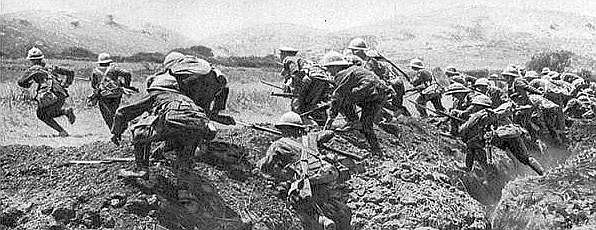
The ANZAC landing was intended to cut-off Turkish troops that had gone down the peninsula to attack the British and French landings. But things went wrong. Troops landed in the wrong places. Misfires reduced the naval bombardment to a few shots. While Australian love to blame the Pommes it is true that the British and French each suffered a greater death toll that the Australians, though no one in Australia seems to know this, ever happy to be victims.
Skip to content
